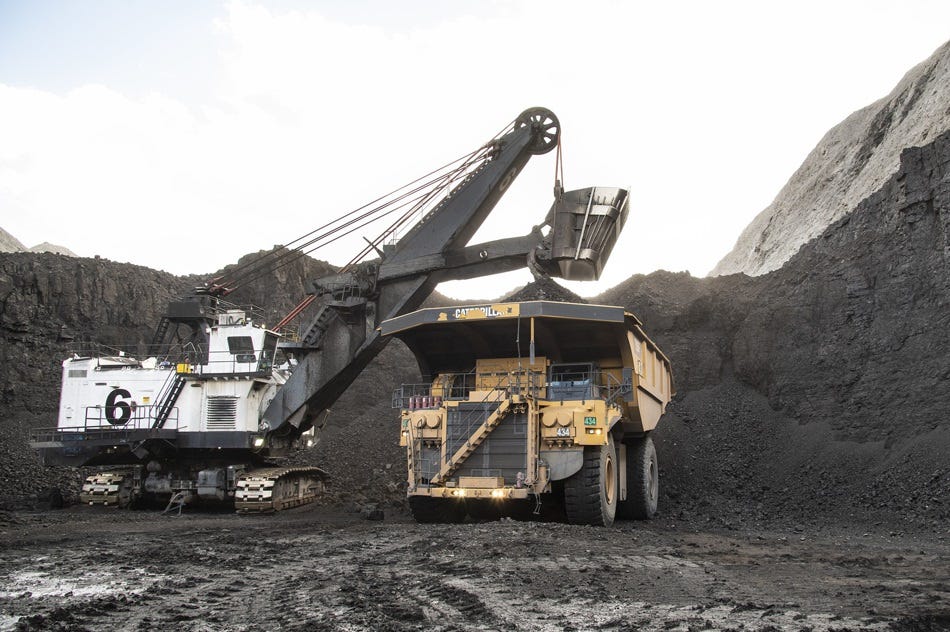
In a move that will help hurry up the already-imminent demise of coal as an energy source in the USA, the Biden administration on Thursday proposed ending new coal leasing on federal lands in the Powder River Basin. Sprawling across 13 million acres in Montana and Wyoming, it’s currently the largest coal-producing region in the country, the source of nearly half the coal we use. The proposal from the Bureau of Land Management would allow existing coal operations to continue until they’re played out/no longer profitable/regulated out of existence, but no expansion or new leases would be allowed.
As the Associated Press notes,
The immediate impact is likely to be limited because coal leases take many years to develop and demand has flagged in recent years. But the proposal drew a harsh pushback from Republicans in Congress, coming just weeks after President Joe Biden’s Democratic administration unveiled an air quality rule that could force many coal-fired power plants to reduce their pollution or shut down.
We have cleverly replaced the link in that paragraph to our own story about the new power plant rule, because that is how we roll, coal or no.
While it would be fun to think this was an early result of the recent change in Interior Department rules requiring that BLM land use decisions take climate into account, it turns out that the proposal is actually responding to a
2022 court order that said two federal land management plans drafted for the Powder River Basin during former President Donald Trump’s administration had failed to adequately take into account climate change and public health problems caused by burning coal.
So in other words, a lot like the new policy at Interior, but from a different origin point. We like how it worked out!
And because the Biden administration is Gallant to Donald Trump’s Goofus, the new proposal is going through the standard rule-making process, which allows 30 days for public comment before it goes into effect. The notice in the Federal Register states that the two extant mines in Montana “have existing leases with sufficient coal reserves to maintain existing mine production levels until 2035 for Spring Creek Mine and 2060 for Rosebud Mine,” and that the reserves for another 12 mines operating in Wyoming will keep them going until 2041.
Also, given that the aforementioned powerplant emissions standards require that any coal plants still in operation past 2039 must eliminate 90 percent of their carbon dioxide emissions or shut down altogether, those timelines seem pretty good, too.
As E&E News points out, while the area is a major producer of coal right now, “data shows an overall decline over recent years — a not surprising development as coal-fired power plants retire.”
Reactions are about what you’d expect; Republicans and coal companies say it’s the apocalypse and a dangerous political move that will cost jobs (in an already-dying industry, because coal can’t compete with renewables or fossil gas), and environmental and climate advocates are saying it’s just common sense. As we’ve noted previously, coal now provides only about 16 percent of US electric power (and shrinking) but even that small slice of the energy sector is responsible for 55 percent of the CO2 carbon dioxide from all US electric power generation.
In a statement, Paula Antoine, board chair of the Western Organization of Resource Councils, said, in essence, yay:
BLM’s announcement recognizes that coal’s era is ending, and it’s time to focus on supporting our communities through the transition away from coal, investing in workers, and moving to heal our lands, waters and climate as we enter a bright clean energy future.
I was thinking of including an outraged quote from a Republican member of Congress or some other fossil, but hell, you already know what they’d say and it would just be lies anyway, so instead let’s celebrate these factoids from the Washington Post, shall we?
U.S. coal output tumbled 36 percent from 2015 to 2023, according to the Energy Information Administration. The Sierra Club’s Beyond Coal campaign estimates that 382 coal-fired power plants have closed down or proposed to retire, with 148 remaining.
Hey, cool thing that the Infrastructure Law and the Inflation Reduction Act both offer plenty of incentives for clean energy and manufacturing to relocate to communities that had been dependent on fossil fuels, huh?
Have a great Saturday, kids. I’ll be riding my e-bike if the weather cooperates. Oh, and guess what happened Friday? When the recycling truck came, it was far quieter than it used to be — I only noticed it had arrived when I heard it dumping the bin and then backing up, with the beeps. It’s one of the five electric trucks Boise has rolled out so far.
We’re on the way to cleaner garbage!
[AP / Heatmap News / E&E News / Federal Register]
Yr Wonkette is funded entirely by reader donations. If you can, please become a paid subscriber, or if you would rather do a one-time donation, we would rather you do just that!
























































![Key Metrics for Social Media Marketing [Infographic] Key Metrics for Social Media Marketing [Infographic]](https://www.socialmediatoday.com/imgproxy/nP1lliSbrTbUmhFV6RdAz9qJZFvsstq3IG6orLUMMls/g:ce/rs:fit:770:435/bG9jYWw6Ly8vZGl2ZWltYWdlL3NvY2lhbF9tZWRpYV9yb2lfaW5vZ3JhcGhpYzIucG5n.webp)























